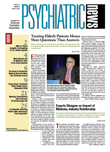As psychiatrists know only too well, childhood sexual abuse can devastate young people psychologically and thus render them vulnerable to a spate of mental illnesses—alcohol abuse, depression, drug abuse, panic disorder, posttraumatic stress disorder, and suicide attempts (Psychiatric News, August 3, 2007; August 17, 2007).
Bulimia nervosa can be added to the list of unfavorable outcomes as well, some studies have suggested. Now a new one does too. It was headed by Lena Sanci, Ph.D., a senior lecturer in general practice at the University of Melbourne in Australia. Results were published in the March Archives of Pediatrics and Adolescent Medicine.
Sanci and her coworkers randomly selected some 1,000 female students, average age 15, from 44 public, Catholic, or private schools to participate in their study. They followed their subjects until they were young adults to see whether they developed bulimia nervosa or anorexia nervosa. Thirty-five were found to have acquired bulimia and 32 anorexia during that age span.
At age 24, the subjects were asked certain questions to determine whether they had experienced sexual abuse before age 16.
“We measured childhood sexual abuse in adulthood because our state has a statutory requirement to report all abuse in children younger than 17 years to government services,” Sanci and her coworkers explained in their study report. “To have informed parents and participants of this at the time carried a risk of selective refusal for those with abuse histories. Furthermore, participation... required parental and school consent. Inclusion of childhood sexual abuse questions may have reduced our response rates. By the age of 24 years, we believed participants would be sufficiently comfortable to encounter these questions, yet not as removed from the experience as to limit recall.”
Ninety-six of the subjects reported one episode of sexual abuse, and 70 reported two or more episodes. The researchers then looked to see whether there were any links between subjects' retrospective reports of having been abused sexually as a child and their later developing bulimia or anorexia. During this analysis, subjects' background differences—say, their parents' educational levels and whether their parents were divorced—were considered.
Sanci and her colleagues found no link between reports of having been sexually abused in childhood and developing anorexia, but they did find a link with bulimia. Compared with subjects who had experienced no childhood sexual abuse, the incidence of bulimia was three times higher among those who reported one episode and five times higher among those who reported two or more episodes. Furthermore, even when some possibly confounding factors such as subjects' anxiety, depression, or dieting behavior before developing an eating disorder were considered, it reduced the association between childhood sexual abuse and bulimia only a little.
Thus, “Childhood sexual abuse seems to be a risk factor for the development of bulimic syndromes, not necessarily mediated by psychiatric morbidity or severe dieting,” Sanci and her group concluded in their report.
Their findings largely jive with those obtained by other investigators, they pointed out. In four different studies, investigators were able to link childhood sexual abuse with both bulimia and anorexia, but the links they found were much stronger for bulimia.
Sanci told Psychiatric News, “I was surprised that we found such a clear association between childhood sexual abuse and bulimia symptoms, as there has been so much controversy in the past [about whether such a connection exists].”
“This paper takes us a step further in confirming suspicions that clinicians have long had that childhood sexual abuse is common in young women with bulimia,” George Patton, M.D., a professor of psychiatry at the University of Melbourne and senior investigator of the study, added.“ The paper [also] takes us a step further by suggesting that sexual abuse may initiate a pattern of dealing with emotional distress that brings a high likelihood of bulimia. Young bulimics share both emotional secrecy and profound guilt with many victims of sexual abuse. It is possible that for some patients, this emotional style begins with the abusive experience. This psychological style may be an important focus for psychotherapy.”
The study was funded by the Australian National Health and Medical Research Council, the Australian Center for Excellence in Eating Disorders, and a research grant from the Australian National Depression Initiative.
